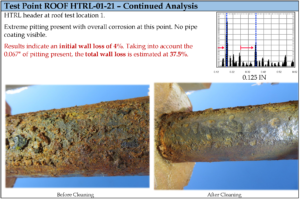An unfortunate truth in ammonia refrigeration is that new, shiny, freshly-painted or insulated pipe doesn’t always stay that way. Nearby water or chemical lines sometimes form leaks. Salty sea air is ruinous to carbon steel. Insulation systems don’t stay intact without deliberate upkeep. Ladders, hail, and construction activities also frequently cause pipe coating or insulation to lose integrity. Once our (largely) carbon steel systems are exposed to air and moisture, they begin to degrade.
The Standard for Inspection, Testing, and Maintenance of Closed-Circuit Ammonia Refrigeration Systems, IIAR Standard 6 (2019 Edition), requires regular observation for damage due to corrosion or pitting. If this damage is observed, it requires annual testing of these areas.
This required testing is where RC&E can help you.
Thickness Testing: Whether piping or a pressure vessel, RC&E can measure how much metal is remaining in any particular spot. The end result is knowledge of exactly how much material is left in an affected area. Industry standards and engineering analysis can make a determination whether this remains fit for service.
Detailed Reporting: RC&E thickness testing not only reports the amount of material left, it details the environment at the test point. Is there water? Ice? Is the point likely to get worse or stay the same? We endeavor to give you all of the information, pictures, and analysis to forecast your facility’s needs.

Focused Testing: RC&E non-destructive testing doesn’t perform a blanket test on a huge area that shuts off areas of your facility like some radiographic methods. We test the exact area(s) of concern, with no interference in how the remainder of your process operates.
Technology: RC&E utilizes A-Scan ultrasonic thickness testing to determine the health of your system. This means that in the selected point, if there is already a coat of paint, we don’t need to remove it (lessening protection) to perform a test. Areas of concern get tested for the remaining wall thickness with tolerances of ± 0.002″. We don’t damage healthy systems, but gather data on compromised ones.
Flexible Scale: Whether you want a general idea of how the entire system is operating, or a very specific analysis of one area, RC&E can tailor a non-destructive testing scope to your needs. Some areas can be tested in an afternoon, and entire facilities can be analyzed over the course of days/weeks for in-depth knowledge of the whole system’s health.
Multiple Sealing Technologies: Wherever testing requires insulation to be cut away, RC&E can seal it back up in several ways. Patented inspection plugs can be used, pipe-coating gel to establish a pipe coating, sealants to restore the vapor barrier, and spray foam to maintain insulation performance. If these measures aren’t enough, our in-house insulation department can fully replace sections of insulation to ensure the utmost in thermal performance and moisture/vapor protection.
Follow-Through: After an RC&E report is delivered, our support doesn’t stop. If there are lingering questions or points that require clarification our team would be more than happy to help.
Email or call us today to have RC&E assist you with all your PSM/RM Program needs! info@RCE-Chill.com (888) 357-COOL (2665)